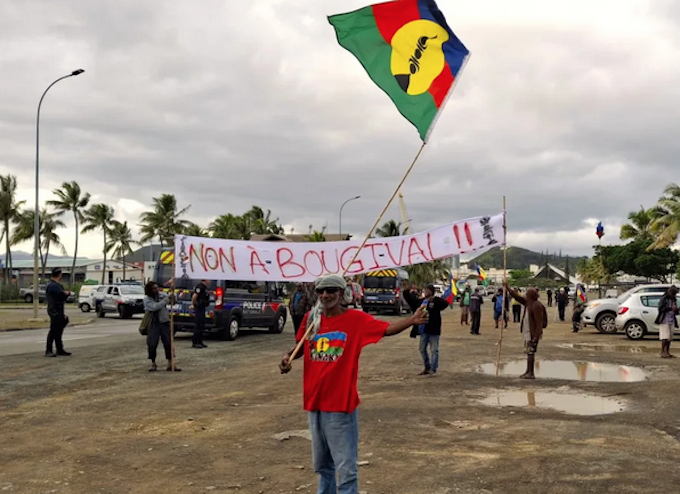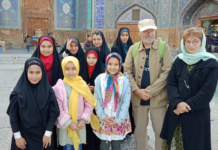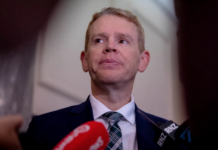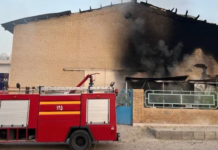
By Patrick Decloitre, RNZ Pacific correspondent French Pacific desk
A newly established “drafting committee” held its inaugural meeting in Nouméa this week, aiming to translate the Bougival agreement — signed by New Caledonian political parties in Paris last month — into a legal and constitutional form.
However, the first sitting of the committee on Thursday took place without one of the main pro-independence parties, the FLNKS (Kanak and Socialist National Liberation Front), which chose to stay out of the talks.
Visiting French Minister for Overseas Manuel Valls, who was in New Caledonia until the weekend, met a delegation of the FLNKS on Wednesday for more than two hours to try and convince them to participate.
- READ MORE: French Overseas Minister in New Caledonia in bid to ‘save’ Bougival deal
- Other Kanaky New Caledonia reports
The FLNKS earlier announced a “block rejection” of the deal signed in Bougival because it regarded the text as “incompatible” with the party’s objectives and a “lure” in terms of self-determination and full sovereignty.
The deal outlines a roadmap for New Caledonia’s political future.
It is a compromise blueprint signed by New Caledonia’s parties from across the political spectrum and provides a vision for a “State” of New Caledonia, a dual French-New Caledonian citizenship, as well as a short-term transfer of such powers as foreign affairs from France to New Caledonia.
Even though FLNKS delegates initially signed the document in Bougival on July 12, their party later denounced the agreement and said its negotiators had no mandate to do so.
On Wednesday, as part of a round-up of talks with most political parties represented at the New Caledonian Congress, Valls held a separate meeting with a new delegation from FLNKS officials in Nouméa, in a last-ditch bid to convince them to take part in the “drafting committee” session.

‘Serene but firm’, says FLNKS
The FLNKS described the talks with Valls as “serene but firm”.
The FLNKS is demanding a “Kanaky Agreement” to be concluded before 24 September 2025 and a fully effective sovereignty process to be achieved before the next French Presidential elections in April 2027.
It also wants the provincial elections, initially scheduled to take place no later than November 30, to be maintained at this date, instead of being postponed once again to mid-2026 under the Bougival prescriptions.
But they were nowhere to be seen on Thursday, when the drafting group was installed.
Valls also spoke to New Caledonia’s chiefly (customary) Senate to dispel any misconception that the Bougival deal would be a setback in terms of recognition of the Indigenous Kanak identity and place in New Caledonia.
He said the Bougival pact was a “historic opportunity” for them to seize “because there is no other credible alternative”.
Indigenous recognition
The minister stressed that. even though this Indigenous recognition may be perceived as less emphatic in the Bougival document, the same text also clearly stipulated that all previous agreements and accords, including the 1998 Nouméa Accord which devoted significant chapters to the Kanak issue and recognition, were still fully in force.
And that if needed, amendments could still be made to the Bougival text to make this even more explicit.
The chiefs were present at the opening session of the committee on Thursday.
So was a delegation of mayors of New Caledonia, who expressed deep concerns about New Caledonia’s current situation, 15 months after the riots that broke out in New Caledonia mid-May 2024, causing 14 deaths, more than 2 billion euros (NZ$3.8 billion) in material damages and thousands of jobless due to the destruction of hundreds of businesses.
New Caledonia’s gross domestic product (GDP) is estimated to have dropped by 10 to 15 percent over the past 15 months.
As part of the post-riot ongoing trauma, New Caledonia is currently facing an acute shortage in the medical sector personnel — many of them have left following security issues related to the riots, gravely affecting the provision of essential and emergency services both in the capital Nouméa and in rural areas.

Who turned up?
Apart from the absent FLNKS, two other significant components of the pro-independence movement, former FLNKS moderate members Union Nationale pour l’Indépendance (UNI), consisting of PALIKA (Kanak Liberation Party) and UPM (Union Progressiste en Mélanésie) were also part of the new drafting committee participants.
UNI leaders said earlier they had signed the Bougival document because they believe even though it does not provide a short-term independence for New Caledonia, this could be gradually achieved in the middle run.
PALIKA and UPM, in a de facto split, distanced themselves from the FLNKS in August 2024 and have since abstained from taking part in the FLNKS political bureau.
On the side of those who wish New Caledonia to remain part of France (pro-France), all of its representative parties, who also signed the Bougival document, were present at the inaugural session of the drafting committee.
This includes Les Loyalistes, Le Rassemblement-LR, Calédonie Ensemble and Wallisian-based “kingmaker” party Eveil Océanien.
After the first session on Thursday, pro-France politicians described the talks as “constructive” on everyone’s part.

‘My door remains wide open’
But there are also concerns as to whether such sessions (the next one is scheduled for Saturday) can viably and credibly carry on without the FLNKS taking part.
“We just can’t force this or try to achieve things without consensus,” Eveil Océanien leader Milakulo Tukumuli told local media on Thursday.
Since Valls arrived in New Caledonia (on his fifth trip since he took office late 2024) this week, he has mentioned the FLNKS issue, saying his door remained “wide open”.
“I am well aware of the FLNKS position. But we have to keep going”, he told the drafting committee on Thursday.
The “drafting” work set in motion will have to focus in formulating, with the help of a team of French officials (legalists and constitutionalists), a series of documents which all trickle down from the Bougival general agreement so as to translate it in relevant and appropriate terms.

Some of the most urgent steps to be taken include formalising the postponement of the provincial elections to mid-2026, in the form of an “organic law”.
Among other things, the “organic law” is supposed to define the way that key powers should be transferred from France to New Caledonia, including following a vote by the local Congress with a required majority of 36 MPs (over two thirds), the rules on the exercise of the power of foreign affairs “while respecting France’s international commitments and fundamental interests”
Tabled in French Parliament
The text would be tabled to the French Parliament for approval, first before the Senate’s Law Committee on 17 September 2025 and then for debate on 23 September 2025. It would also need to follow a similar process before the other Parliament chamber, the National Assembly, before it can be finally endorsed by December 2025.
And before that, the French State Council is also supposed to rule on the conformity of the Constitutional Amendment Bill and whether it can be tabled before a Cabinet meeting on 17 September 2025.
Another crucial text to be drafted is a Constitutional amendment Bill that would modify the description of New Caledonia, wherever it occurs in the French Constitution (mostly in its Title XIII), into the “State of New Caledonia”.
The modification would translate the concepts described in the Bougival Agreement but would not cancel any previous contents from the 1998 Nouméa Accord, especially in relation to its Preamble in terms of “founding principles related to the Kanak identity and (New Caledonia’s) economic and social development”.
In the same spirit, every paragraph of the Nouméa Accord which does not contradict the Bougival text would remain fully valid.
The new Constitutional amendment project is also making provisions for a referendum to be held in New Caledonia no later than 28 February 2026, when the local population will be asked to endorse the Bougival text.
Another relevant instrument to be formulated is the “Fundamental Law” for New Caledonia, to be later endorsed by New Caledonia’s local Congress.
The “Fundamental Law”, a de facto Constitution, is supposed to focus on such notions and definitions as New Caledonia “identity signs” (flag, anthem, motto), a “charter of New Caledonia values, as well as the rules of eligibility to acquire New Caledonia’s nationality and a “Code of Citizenship”.
Valls said he was aware the time frame for all these texts was “constrained”, but that it was a matter of “urgency”.
This article is republished under a community partnership agreement with RNZ.













































